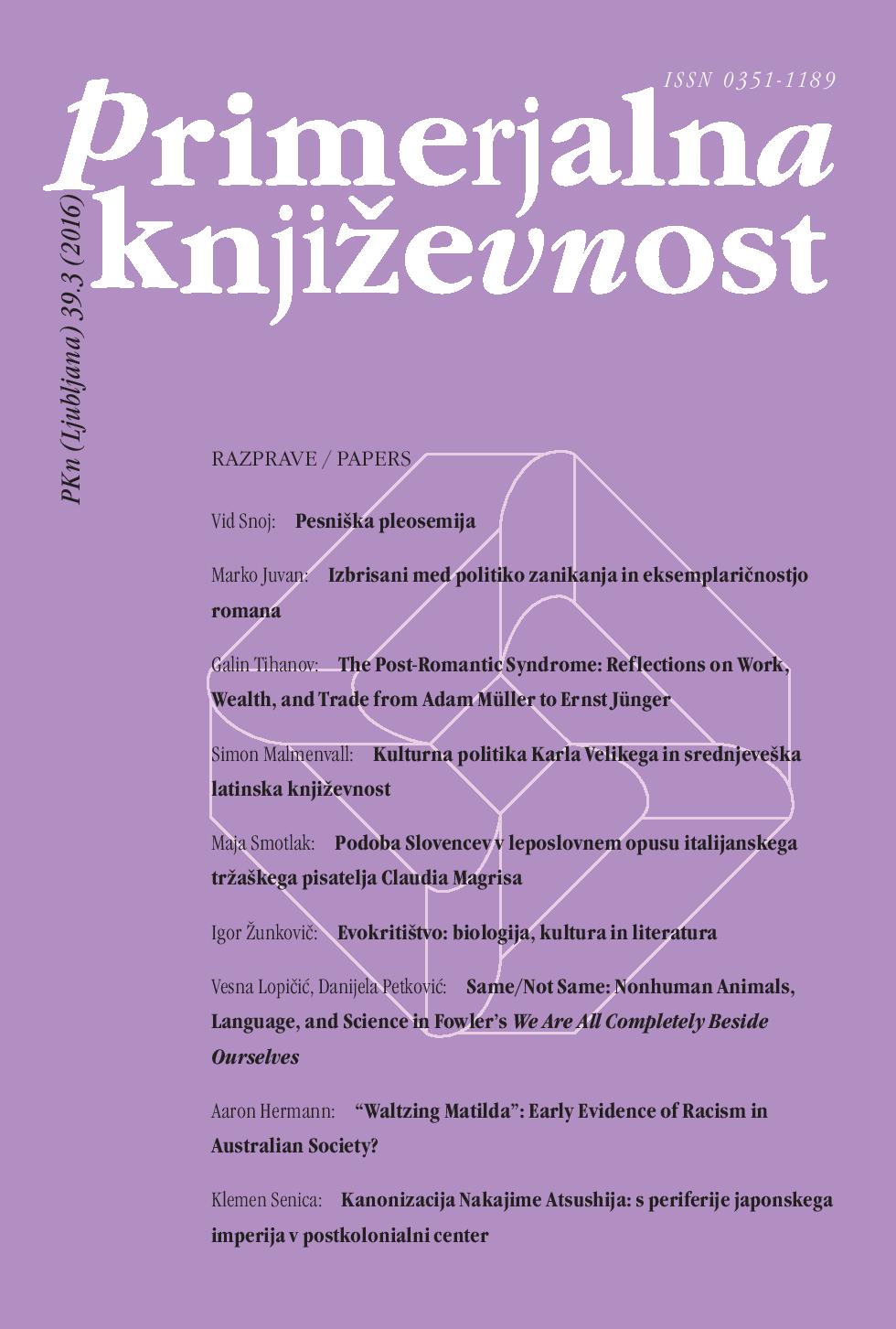Charlemagne’s Cultural Policy and Medieval Latin Literature
Keywords:
Charlemagne, Middle Ages, Latin literature, Carolingian Renaissance, Christianity, RomanitasAbstract
The article presents the key characteristics of the cultural policy of the king and emperor Charlemagne (768–814), focusing mainly on the ideational presuppositions of literary production in Latin during the Carolingian Renaissance from the end of the eighth century to the end of the ninth century. The essence of the cultural historical period called the Carolingian Renaissance can be described as a selective Christian-defined return to classical Roman sources representing an ideal of “pure” Latin found in ancient Roman literary (or “humanistic”) works. Its primary goal was to lay the intellectual (i.e., linguistic, rhetorical, philosophical, and theological) foundations for enhancing the orthodoxy of the “Roman” (western) Church committed to an in-depth understanding of the Bible, the Church fathers, and consequently Christian doctrine as a whole. Copying ancient texts and composing new ones was part of a wider cultural political project of “correction” (correctio) of Carolingian society; namely, an aspiration towards an overwhelming presence of Christianity in the thoughts and behavior of the masses as well as individuals. – The thriving of education, coherent Latin, and a unified liturgy was a result of the conscious efforts of Charlemagne, who – as a new (western) Roman emperor – took responsibility for the internal solidity of the state, making possible the reinforcement of the ethnically diverse empire on the basis of a common religious identity and the conviction that the Carolingian Roman Empire represented a continuation of the Roman statehood tradition. The internal connectedness of the empire was made possible through a common religion, common ruler or ruling dynasty, common language of politics and culture, and common “Roman” liturgy – and, finally, due to the political alliance between the Carolingian monarch and the Roman bishop (i.e., the pope). Following this concept, a special notion about the continuity of the Roman world was formed by the creators of the Latin literature of the time as a motivation to adjust the authority of the classical Latin style to the Christian worldview. This notion of continuity can be captured by the concept of “Roman-ness” (Romanitas), on which the Charlemagne’s overall aspirations towards a new (western) Roman Empire were built.References
Banniard, Michael. »Language and Communication in Carolingian Europe«. The New Cambridge Medieval History. Volume II. Ur. R. McKitterick. Cambridge: Cambridge University Press, 1995. 695–708.
Barbero, Alessandro. Charlemagne: Father of a Continent. Prev. A. Cameron. Berkeley: University of California Press, 2004.
Becher, Matthias. »Zwischen Krieg und Diplomatie. Die Außenpolitik Karls des Großen«. Das Reich Karls des Großen. Ur. M. Becher. Darmstadt: Theiss, 2011. 33–46.
Berschin, Walter. »Biography«. Medieval Latin: An Introduction and Bibliographical Guide. Ur. F. A. C. Mantello, A. G. Rigg. Washington: The Catholic University of America Press, 1996. 607–617.
Contreni, John J. »The Carolingian Renaissance: Education and Literary Culture«. The New Cambridge Medieval History. Volume II. Ur. R. McKitterick. Cambridge: Cambridge University Press, 1995. 709–757.
Čoralić, Lovorka. »Einhard i Život Karla Velikog«. Život Karla Velikog (Vita Karoli Magni). Ur. I. Goldstein. Zagreb: Latina et graeca, 1992. 28–36.
Einhardus. Život Karla Velikog (Vita Karoli Magni). Ur. I. Goldstein. Zagreb: Latina et graeca, 1992. (slovenski prevod: Einhardus. Življenje Karla Velikega. Prev. Blaž Strmole. Keria: studia Latina et Graeca 15.1 (2013): 151–196.)
Ganz, David. »Book Production in the Carolingian Empire and the Spread of Caroline Minuscule«. The New Cambridge Medieval History. Volume II. Ur. R. McKitterick. Cambridge: Cambridge University Press, 1995. 786–808.
– – –. »Einhard’s Charlemagne: The Characterisation of Greatness«. Charlemagne: Empire and Society. Ur. J. Story. Manchester, New York: Manchester University Press, 2005. 38–51.
Garipzanov, Ildar H. The Symbolic Language of Authority in the Carolingian World. Leiden: Brill, 2008.
Goldstein, Ivo. »Život i doba Karla Velikog«. Život Karla Velikog (Vita Karoli Magni). Ur. I. Goldstein. Zagreb: Latina et graeca, 1992. 7–27.
Guzman, Gregory G. »Encyclopedias«. Medieval Latin: An Introduction and Bibliographical Guide. Ur. F. A. C. Mantello, A. G. Rigg. Washington: The Catholic University of America Press, 1996. 702–707.
Hartmann, Wilfried. »Maßnahmen eines Analphabeten? Der Kampf um eine Bildungsreform im Karolingerreich«. Das Reich Karls des Großen. Ur. M. Becher. Darmstadt: Theiss, 2011. 89–102.
McKitterick, Rosamond. Charlemagne: The Formation of the European Identity. Cambridge: Cambridge University Press, 2008.
– – –. »The Carolingian Renaissance of Culture and Learning«. Charlemagne: Empire and Society. Ur. J. Story. Manchester, New York: Manchester University Press, 2005. 151–166.
– – –. The Frankish Kingdoms under the Carolingians 751–987. Harlow: Routledge, 2004.
Ray, Roger. »Historiography«. Medieval Latin: An Introduction and Bibliographical Guide. Ur. F. A. C. Mantello, A. G. Rigg. Washington: The Catholic University of America Press, 1996. 639–649.
Stipišić, Jakov. Pomoćne povijesne znanosti. Zagreb: Školska knjiga, 1985.
Wickham, Chris. The Inheritance of Rome: A History of Europe from 400 to 1000. London: Penguin, 2010.
Ziolkovski, Jan M. »Towards a History of Medieval Latin Literature«. Medieval Latin: An Introduction and Bibliographical Guide. Ur. F. A. C. Mantello, A. G. Rigg. Washington: The Catholic University of America Press, 1996. 505–532.


